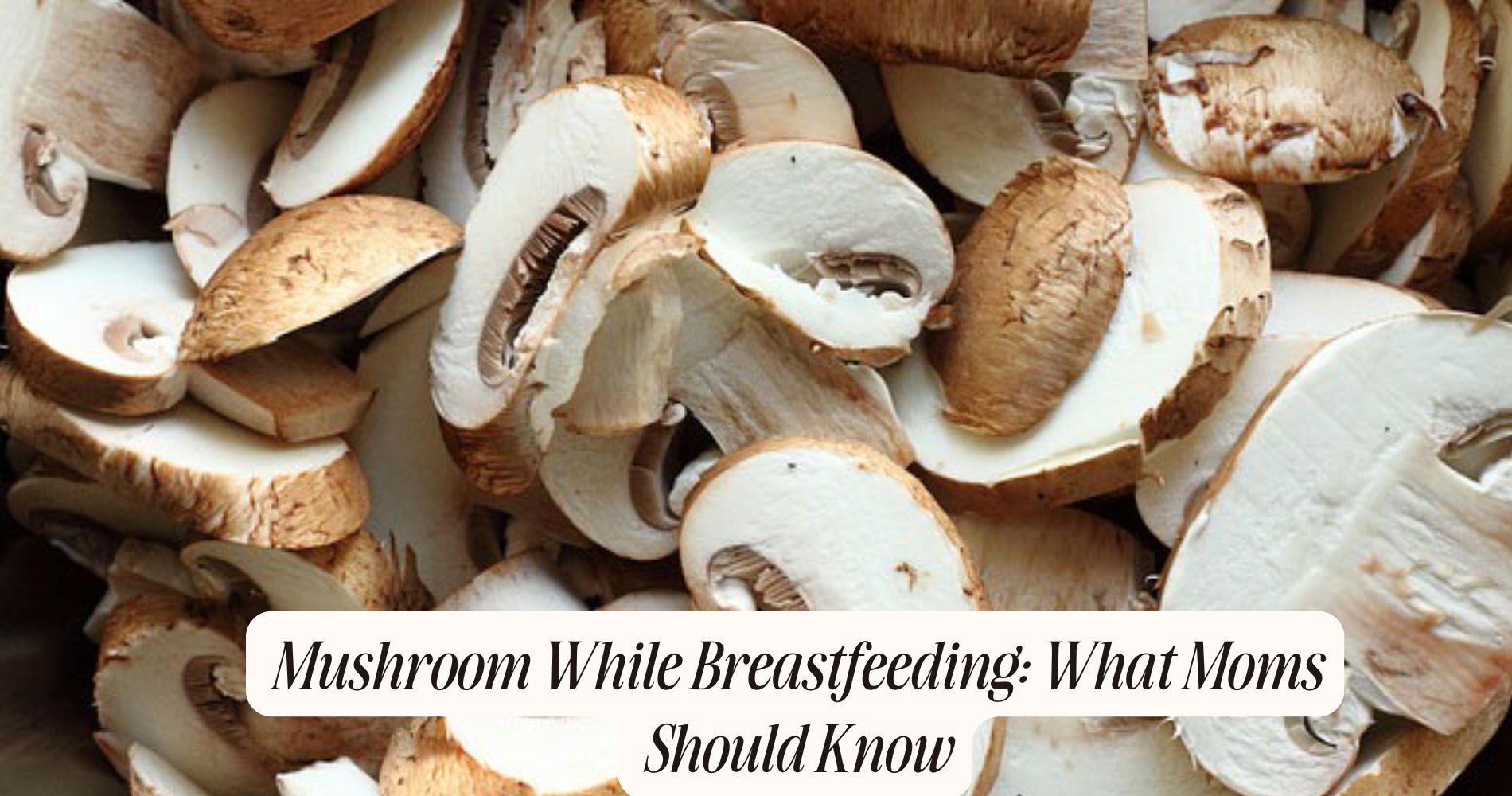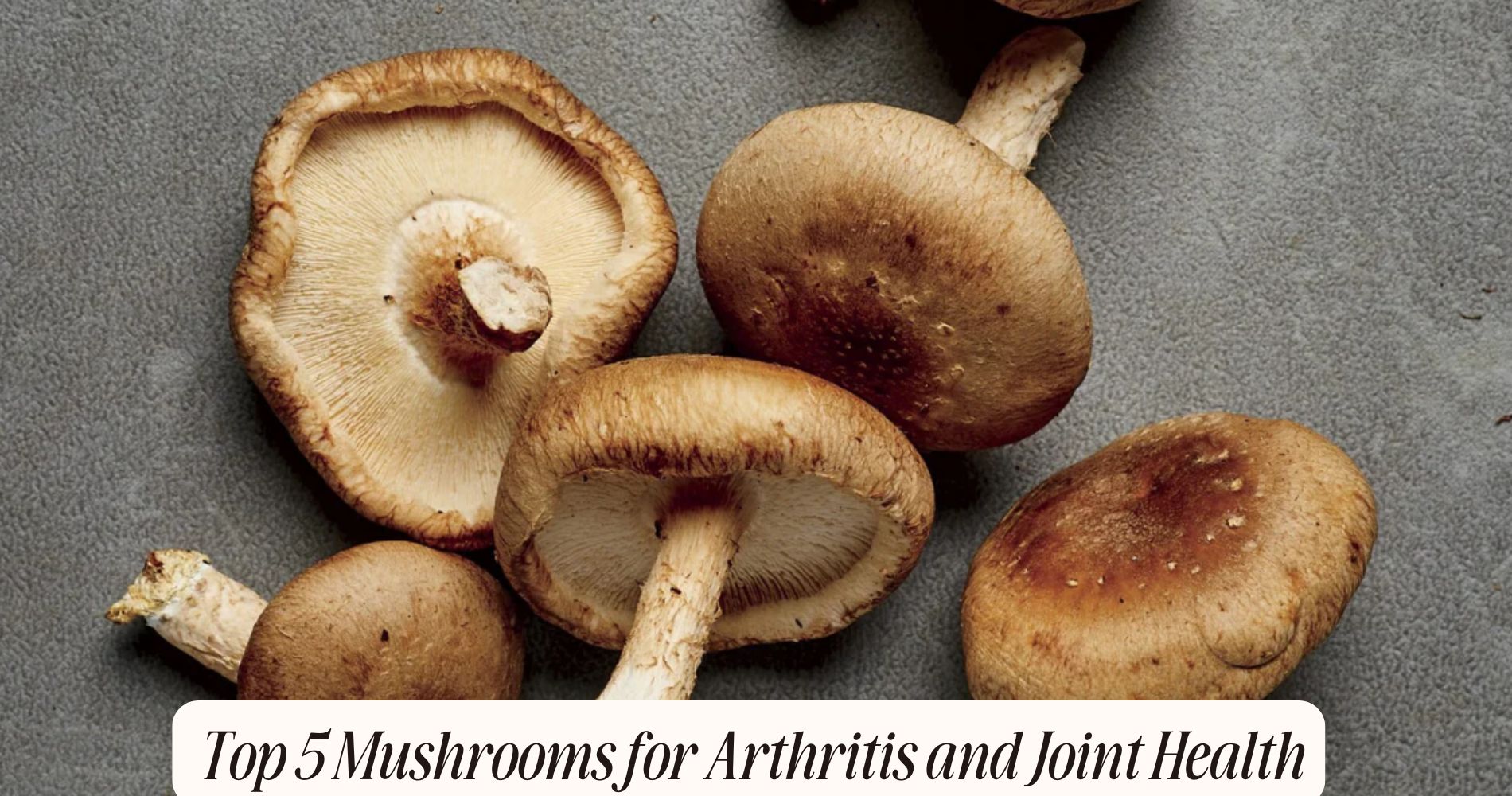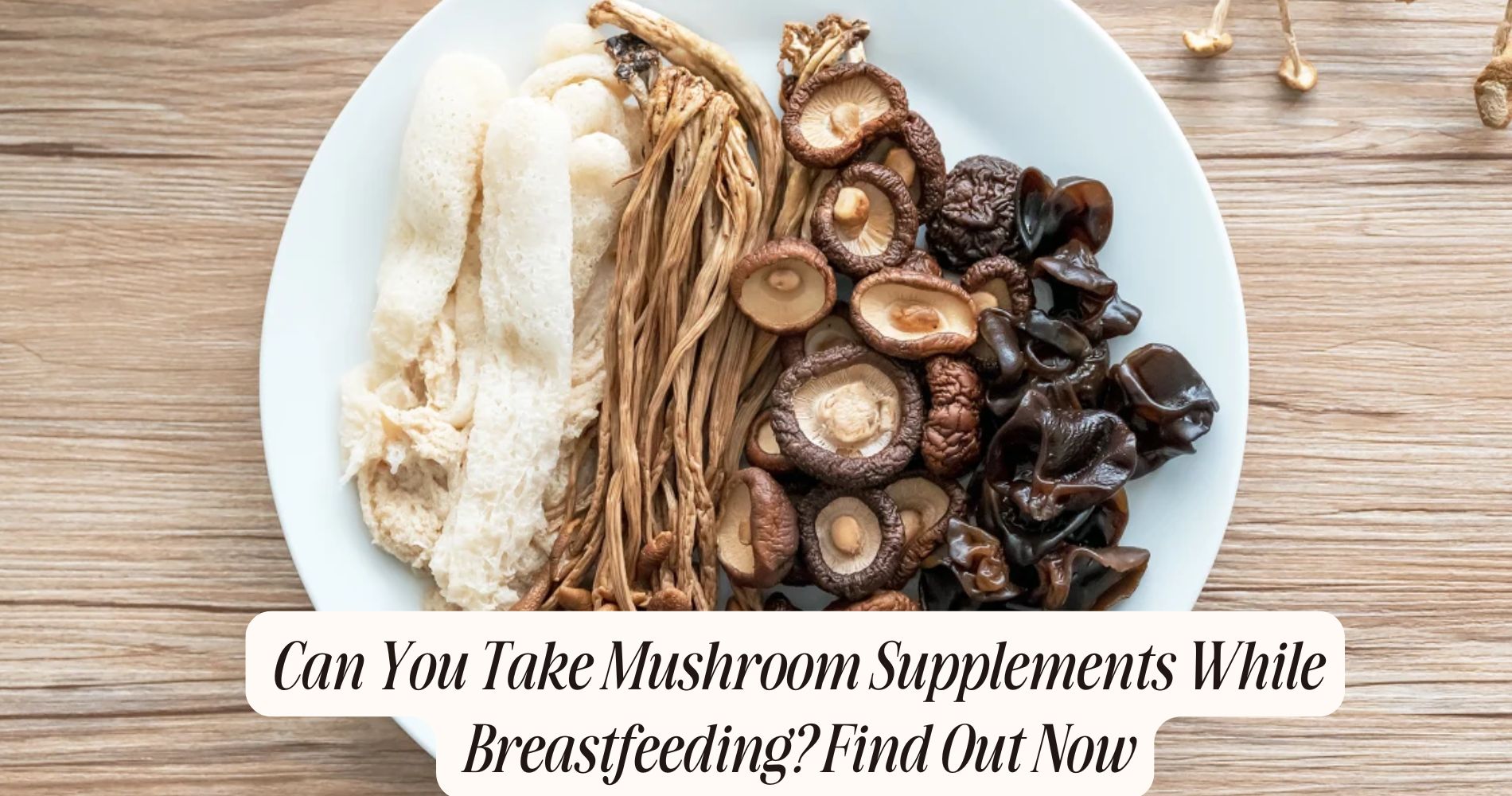
Mushroom While Breastfeeding: What Moms Should Know
Nutritional Benefits of Mushrooms
Mushrooms offer a wealth of nutritional benefits that can be particularly advantageous for breastfeeding mothers. These fungi are low in calories but packed with essential nutrients that support breastfeeding nutrition. For instance, mushrooms are rich in B vitamins, which play a significant role in energy metabolism and help you maintain your stamina during this demanding time.
Additionally, they're a great source of vitamin D, important for bone health and immune function. A strong immune system is essential for both you and your baby, and mushrooms can help bolster that. The mineral content in mushrooms, including selenium and potassium, also contributes to overall health. Selenium is known for its antioxidant properties, while potassium helps regulate fluid balance, which is key during breastfeeding.

Including a variety of mushrooms in your diet not only enhances flavor but also provides diverse mushroom benefits. Their fiber content aids digestion, which can be especially helpful as your body adjusts post-pregnancy.
Safe Mushroom Varieties
When you're breastfeeding, it's important to choose mushroom varieties that are both safe and nutritious.
Common safe options like button, shiitake, and portobello mushrooms can provide essential vitamins and minerals to support your health and your baby's development.
Let's explore these varieties and their benefits to guarantee you're making the best choices during this special time.
Nutritional Benefits of Mushrooms
Incorporating a variety of mushrooms into your diet while breastfeeding can provide essential nutrients that support both your health and your baby's development. Mushrooms are a great source of significant vitamins and minerals, including vitamin D, B vitamins, selenium, and potassium. These mushroom nutrients play an important role in boosting your immune system, promoting energy levels, and supporting the overall health of both you and your infant.
One of the key breastfeeding benefits of mushrooms is their ability to provide antioxidants, which can help combat oxidative stress in your body. This is particularly important during breastfeeding, as your body's demands increase.
Additionally, the fiber content in mushrooms can aid digestion and help maintain a healthy gut, which is beneficial for both you and your baby.
Including mushrooms in your meals can also enhance the flavor of your dishes, making healthy eating more enjoyable. Remember to opt for safe varieties and prepare them properly.
Common Safe Varieties
Choosing safe mushroom varieties is essential for breastfeeding mothers who want to enjoy the nutritional benefits without any risk. When sourcing mushrooms, stick to well-known varieties that are commonly found in grocery stores or farmers' markets. Some safe options include white button mushrooms, cremini, shiitake, and portobello. These mushrooms aren't only delicious but also rich in vitamins, minerals, and antioxidants.

Mushroom preparation plays a vital role in ensuring safety. Always wash your mushrooms thoroughly and cook them properly to eliminate any harmful bacteria. Raw mushrooms can be more challenging to digest and might cause stomach upset, so cooking them is highly recommended. Sautéeing, grilling, or adding them to soups and stews can enhance their flavor while making them safe to eat.
If you're unsure about a mushroom variety, it's best to avoid it. Wild mushrooms can be toxic and should only be foraged by experienced individuals.
Always prioritize safety and consult with a healthcare provider if you have any concerns about your diet while breastfeeding. By choosing safe varieties and preparing them correctly, you can enjoy mushrooms confidently during this special time.
Potential Allergies and Reactions
While mushrooms can be a nutritious addition to your diet during breastfeeding, it's important to take into account potential allergies and reactions. Some individuals may experience allergic reactions to mushrooms, which can range from mild symptoms like itching and hives to more severe responses such as difficulty breathing or swelling.
If you've never eaten mushrooms before, it's wise to introduce them gradually into your diet and monitor your body's response.
Additionally, be aware of mushroom toxicity. Not all mushrooms are safe for consumption; some species can be highly toxic and lead to serious health issues. Even if you know a mushroom variety is generally safe, reactions can still occur.
If you notice any adverse symptoms after eating mushrooms, stop consuming them and consult a healthcare professional.
It's also worth considering that the flavors and compounds in mushrooms might affect your baby, leading to potential digestive discomfort.
Cooking Methods for Safety
When cooking mushrooms while breastfeeding, it's important to use safe techniques to protect both you and your baby.
Focus on recommended mushroom varieties and make sure you're following proper storage practices to maintain freshness.
Safe Cooking Techniques
To guarantee safety while cooking mushrooms during breastfeeding, it's crucial to use proper techniques that eliminate potential risks. Start by thoroughly washing mushrooms to remove dirt and contaminants.
One effective method is using sautéing techniques, which involve cooking mushrooms quickly in a small amount of oil over medium-high heat. This not only enhances their flavor but also guarantees that they reach a safe internal temperature, killing off any harmful bacteria.
For a nutritious alternative, consider making mushroom broths. When preparing broth, simmer mushrooms for an extended period to extract their flavors and nutrients, while also guaranteeing any potential pathogens are eliminated. Strain the broth well before consumption.
Always avoid consuming raw or undercooked mushrooms, as this can pose risks to both you and your baby. If you're trying a new variety, research its edibility and safe cooking practices before including it in your meals.
Recommended Mushroom Varieties
Exploring different mushroom varieties can enhance your meals while guaranteeing safety during breastfeeding. When choosing mushrooms, it's crucial to focus on those that are both safe and beneficial. Common culinary varieties like button, shiitake, and portobello are excellent choices. These mushrooms not only add flavor and texture to your dishes but also provide vital nutrients.
Medicinal mushrooms, such as reishi and lion's mane, can offer additional health benefits. While these are often used in supplements or teas, incorporating them into your cooking can boost your immune system and overall well-being. Just make certain to cook these mushrooms thoroughly to maximize their benefits and minimize any potential risks.

When adding mushrooms to your meals, consider sautéing, grilling, or baking to enhance their flavors. Avoid raw preparations, as cooking helps eliminate any harmful bacteria and promotes better digestion.
Always source your mushrooms from reputable suppliers to guarantee quality and safety. By selecting the right varieties and cooking them properly, you can enjoy the culinary uses of mushrooms while supporting your health and your baby's during breastfeeding.
Proper Storage Practices
Storing mushrooms properly is just as important as choosing the right varieties for your meals, especially while breastfeeding. Fresh mushrooms typically have a shelf life of about five to seven days when stored correctly.
To maximize their freshness, start by keeping them in their original packaging or transferring them to breathable storage containers. Avoid plastic bags; instead, opt for paper bags, which allow moisture to escape and prevent mold.
Keep your mushrooms in the refrigerator, ideally in the vegetable crisper, where the temperature and humidity levels are ideal. If you've cooked mushrooms, store them in airtight containers in the fridge. They'll last for about three to five days when stored this way.
If you find yourself with excess mushrooms, consider freezing them. However, it's best to sauté or blanch them first to preserve their texture and flavor.
Once they're cooked, let them cool, then place them in freezer-safe containers. This method can greatly extend their shelf life, allowing you to enjoy them even when they're out of season.
Recommended Serving Sizes
When it comes to incorporating mushrooms into your diet while breastfeeding, understanding the recommended serving sizes is crucial for both your health and your baby's development. The general breastfeeding guidelines suggest aiming for a variety of foods, including mushrooms, to guarantee you receive adequate nutrients. A typical serving size for mushrooms is about one cup of raw or cooked mushrooms.
Mushrooms are low in calories and packed with vitamins, minerals, and antioxidants, making them a great addition to your meals. However, moderation is key. Consuming one to two servings of mushrooms per week can provide you with beneficial nutrients without overwhelming your system.
It's also important to pay attention to how your body, and your baby, respond after you eat mushrooms. Some moms may find that certain types of mushrooms, or larger servings, can cause digestive discomfort.
If you notice any adverse reactions, consider reducing your serving sizes or choosing different types of mushrooms. Always prioritize a balanced diet and consult with your healthcare provider if you have any concerns about specific foods while breastfeeding.
Common Myths About Mushrooms
Mushrooms often get a bad rap due to various myths that can mislead breastfeeding moms. One common misconception is that all mushrooms are toxic. While some wild mushrooms can be harmful, most cultivated varieties like button, shiitake, and portobello are safe and nutritious for you and your baby.

Another breastfeeding myth is that mushrooms can cause allergies in nursing infants. In reality, mushrooms aren't common allergens. They're rich in vitamins, minerals, and antioxidants, contributing positively to your diet.
Some also believe that mushrooms can affect milk supply. However, there's no scientific evidence supporting this claim. On the contrary, incorporating mushrooms into your meals can enhance your nutrition, which is essential while breastfeeding.
Lastly, a prevalent misconception is that you should avoid mushrooms altogether due to their "fungal" nature. Instead, you can enjoy a variety of mushrooms in moderation, as they provide unique flavors and health benefits.
Consulting Healthcare Professionals
Consulting healthcare professionals about your diet while breastfeeding is vital for both you and your baby. They can provide tailored advice based on your unique health needs and the nutritional requirements of your little one.
When it comes to incorporating mushrooms into your diet, it's important to discuss mushroom sourcing with your healthcare provider. Not all mushrooms are safe, and some can cause allergic reactions or gastrointestinal issues in both mothers and infants.
Healthcare guidelines recommend that breastfeeding moms consume a balanced diet rich in nutrients, and mushrooms can be a valuable addition due to their vitamins and minerals. However, you should confirm that the mushrooms you choose are sourced from reputable suppliers to avoid contamination.
Your healthcare professional can guide you on which types of mushrooms are safe, how to prepare them, and any potential risks specific to your health situation.
Support Your Health with SUPER MUSHROOM GUMMIES
As you navigate the ins and outs of consuming mushrooms while breastfeeding, consider incorporating Well Gummies' SUPER MUSHROOM GUMMIES into your routine. This convenient gum chew product is packed with 10 functional mushrooms, designed to naturally fuel your brain and energize your body. Our vegan gummies offer calmer energy, sharper focus, and immune support, ensuring a balanced body and clear mind.
With a delicious fresh wild berry flavor, these gummies taste as good as your favorite candy—without the jitters or crash. Enjoy the benefits of mushrooms in a safe, easy, and tasty way with SUPER MUSHROOM GUMMIES.
Frequently Asked Questions
Can Mushrooms Affect Breast Milk Production or Quality?
Mushrooms can enhance your diet, providing nutritional value and various health benefits. While they don't directly affect breast milk production or quality, their nutrients support overall wellness, which can positively impact breastfeeding.
Are There Any Mushrooms to Avoid While Nursing?
While nursing, you should focus on safe, edible varieties of mushrooms. Avoid toxic species like Amanita, as they can pose serious health risks. Always guarantee you know what you're consuming to protect your health and your baby's.
How Should Mushrooms Be Stored for Breastfeeding Moms?
To store mushrooms properly, keep different mushroom types in a paper bag in the fridge. This prevents moisture buildup. Use them within a week for freshness, and always wash them before cooking for safety.
Can Nursing Mothers Consume Mushroom Supplements?
You can consume mushroom supplements as a nursing mother. Various mushroom varieties offer nutritional benefits, including immune support and antioxidants. Just guarantee you choose high-quality products and consult your healthcare provider if you're unsure.
Do Different Cooking Methods Impact Mushroom Safety for Breastfeeding?
Different cooking techniques can impact mushrooms' safety and nutritional benefits. You should thoroughly cook mushrooms to reduce potential toxins. Sautéing, boiling, or grilling enhances their flavors while preserving essential nutrients for your health.
Conclusion
Incorporating mushrooms into your diet while breastfeeding can be a nutritious choice, offering essential vitamins and minerals. Just remember to stick to safe varieties and cook them thoroughly to minimize any risks. Be mindful of potential allergies and adjust your intake based on how your body reacts. If you have any concerns, consulting a healthcare professional can provide personalized guidance. Embrace the benefits of mushrooms while prioritizing your health and your baby's well-being!




